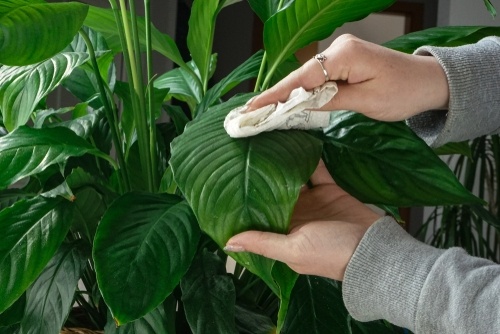
When the garden outside is looking wintry and bare, many of us turn to house plants for a much-needed dose of greenery. Follow these simple guidelines to keep your indoor plants healthy and happy all year round.
Do Your Research First
Before you buy, decide where you want your plants to go, so you know whether you need plants that prefer light or shade. Check the labels when you buy plants to ensure they’ll be suitable for you. There’s no point in buying plants that aren’t right for your space, as they’ll struggle or die, which is very disheartening!
Watering Houseplants
Don’t overwater. More houseplants are killed by overwatering than any other cause. Don't leave your houseplants sitting in a drip tray filled with water unless you’re growing plants native to boggy areas (such as carnivorous plants like sundews and sarracenia). This will exclude all the air from the compost, the roots will rot, and your plant will die. When you water your plants, check the drip trays afterwards and empty them once all the water has drained through.
But don’t underwater either. It can be tricky to tell whether the compost is dry, so use your finger to check the moisture level below the compost surface.
Feeding Houseplants
There’s no one-size-fits-all rule for feeding plants, but don’t overfeed as this is likely to kill the plant. Different plants have different feeding needs, so check your plant’s requirements and follow the instructions on any specialist feeds you buy.
Houseplant Light Requirements
While all plants need some light, take care when placing plants on a sunny windowsill. Even sun-lovers can scorch on a hot sunny day. Most indoor plants do best with bright but indirect light.
Easy Plants for New Houseplant Growers
If you’re new to growing houseplants, try these three ultra-reliable stalwarts:
-
The peace lily is suitable for shady positions and copes well with neglect. You’ll know if you’ve forgotten to water it, as the leaves will wilt, but it’s very forgiving and will revive quickly after watering. Feed once a month with dilute liquid houseplant feed, and wipe the leaves occasionally with a damp cloth to remove dust.
-
The spider plant prefers bright but indirect light. Water regularly to keep the compost just moist, and occasionally feed (2-3 times between spring and autumn) with dilute liquid houseplant feed. Spider plants produce little tufts of leaves that can be planted in pots filled with compost and grow into new plants.
-
Sansevieria – also known as the snake plant, this striking plant has narrow, upright leaves and can cope with a wide range of light levels. Water it when the compost feels dry, and feed once a month in spring and summer with dilute liquid houseplant feed.
We have a fantastic range of house plants in the centre, plus pots, feed, and everything else you need. Visit us soon and pick your perfect houseplant!




